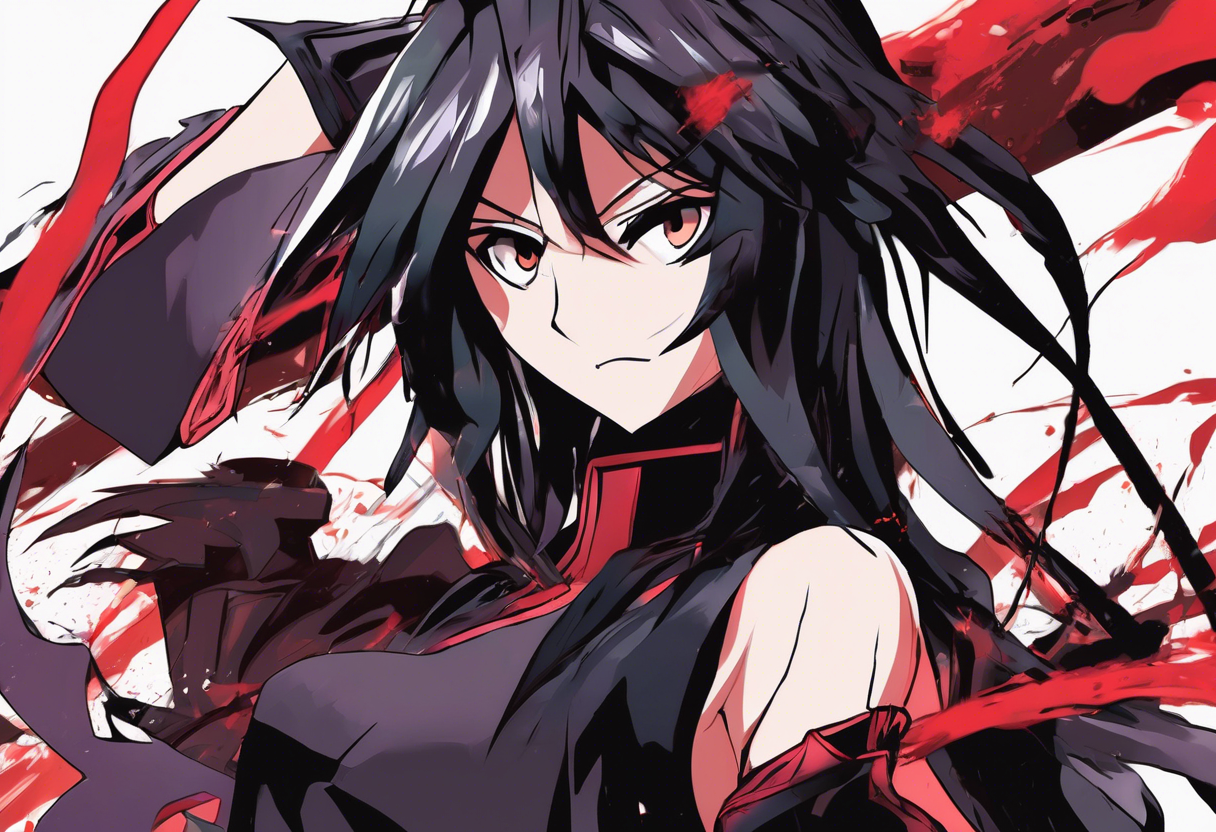Contents
Akame from Akame ga Kill!: A Comprehensive Character Analysis
Introduction
Akame is one of the main protagonist characters in the manga and anime series Akame ga Kill, created by Takahiro and illustrated by Tetsuya Tashiro. Born into a poor family, Akame’s life took a drastic turn when she and her sister Kurome were sold to the Empire, marking the beginning of a tumultuous and transformative journey[5].
Akame’s background is defined by her early experiences of hardship and survival. She and her sister were forced to participate in a cruel exam within a forest inhabited by Danger Beasts, where only a few children managed to survive. This ordeal separated the sisters, with Akame being accepted into the Imperial Assassin group known as the Jaegers, while Kurome was taken by another group[5].
Physically, Akame is characterized by her striking appearance: she has long black hair that reaches down to her knees, red eyes, and a distinctive dark sleeveless top with a white collar[2]. These defining attributes not only make her a visually compelling character but also reflect her inner strength and resilience.
Akame’s narrative function is central to the story of Akame ga Kill. She embodies the themes of survival, loyalty, and the moral ambiguities of a world filled with violence and corruption. Her character serves as a pivot around which the plot revolves, influencing key relationships and driving major plot developments.
Role in the Story
Akame’s arc in Akame ga Kill is marked by significant evolution and pivotal choices. Initially, she is portrayed as a cold and emotionless assassin, devoid of mercy towards her enemies. However, as the series progresses, her interactions with other characters, particularly Tatsumi, reveal a deeper emotional landscape. Her resolve to protect her comrades and her growing attachment to them humanize her character, making her more relatable and complex[5].
One of the key relationships in Akame’s life is with her sister Kurome. Despite being separated and eventually becoming adversaries, their bond remains a powerful emotional anchor for both characters. This sibling dynamic adds a layer of complexity to the narrative, exploring themes of family, loyalty, and the consequences of their early separation[5].
Akame is also deeply involved in the major conflicts of the series. As a member of Night Raid, a group of assassins fighting against the corrupt Empire, she plays a crucial role in several battles and missions. Her skills as an assassin and her possession of the Imperial Arms, Murasame, make her a formidable force on the battlefield[2].
Character Analysis
Akame’s personality is multifaceted, reflecting both her harsh upbringing and her innate humanity. On the surface, she appears to be a ruthless and efficient killer, showing no mercy to her enemies. However, this exterior hides a complex emotional life. She has a deep sense of loyalty and compassion, particularly towards her comrades in Night Raid[5].
Her motivations are rooted in her desire to protect those she cares about and to bring down the corrupt Empire that has caused so much suffering. This drive is strengthened by her personal experiences of pain and loss, making her a compelling and empathetic character.
Akame’s strengths include her exceptional combat skills and her strategic thinking. She is highly intelligent and resourceful, often helping her team navigate dangerous situations. However, her weaknesses lie in her emotional vulnerability and her tendency to put others before herself, which can sometimes put her at risk[5].
Throughout the series, Akame undergoes significant personal growth. She learns to express her emotions more openly and to form meaningful connections with others. This growth enhances her depth as a character and makes her more appealing to the audience.
Themes and Symbolism
Akame is closely associated with several themes that are central to Akame ga Kill. One of the most prominent themes is the morality of violence and the consequences of a life dedicated to killing. Akame’s character embodies the moral ambiguities of such a life, highlighting the psychological and emotional toll it takes on individuals[5].
Another significant theme is the power of human connections and relationships. Despite her tough exterior, Akame’s relationships with her comrades and her sister illustrate the importance of emotional bonds in a world filled with violence and death.
Symbolically, Akame can be seen as a representation of the duality of human nature. Her ability to switch between a cold, efficient killer and a compassionate, caring individual reflects the complexities of human emotions and the capacity for both good and evil within every person.
Cultural Impact
Akame has had a significant cultural impact since her introduction in the manga and anime series. She is widely recognized and admired for her strength, both physical and emotional. Her character has inspired numerous fan artworks, cosplay, and fan fiction, reflecting her strong connection with the fan base[3].
In terms of merchandise, Akame’s image appears on various items such as figurines, posters, and other anime-related products. Her influence extends beyond the series itself, with her character archetype influencing other anime and manga characters.
Critical Reception
Critics and viewers have responded to Akame with a mix of acclaim and criticism. Many praise her complexity and depth, noting that her character adds a rich layer to the narrative of Akame ga Kill. Her evolution from a cold assassin to a more emotionally expressive character is often highlighted as a strong point of the series[5].
However, some critics argue that her character development, while compelling, can be inconsistent at times. The series’ handling of her emotional vulnerability and her relationships with other characters has been subject to various interpretations, with some viewers finding it more convincing than others.
Legacy
Akame’s lasting influence on the anime genre is substantial. She has contributed to the evolution of the "strong female protagonist" archetype, showcasing a character who is both physically powerful and emotionally complex. Her presence in Akame ga Kill has set a precedent for future anime characters, encouraging more nuanced and multidimensional female characters.
In terms of shaping anime discourse, Akame’s character has been a topic of discussion among fans and critics alike. Her portrayal challenges traditional gender roles and explores the complexities of female characters in action-oriented anime series.







